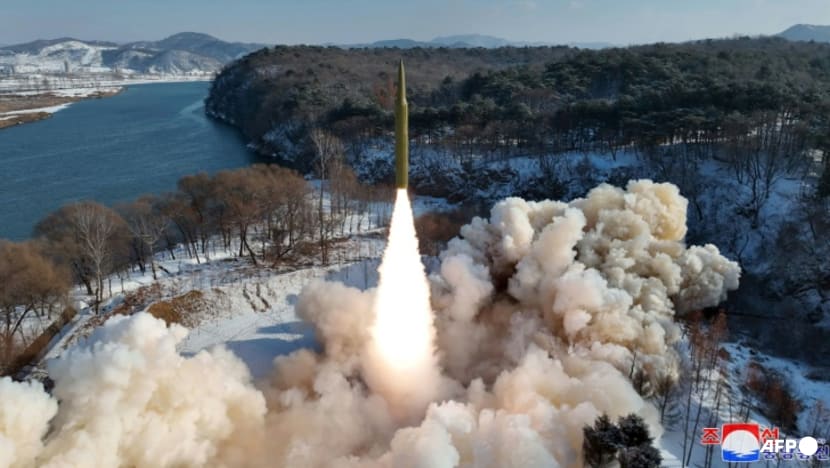Commentary: North Korea unlikely to start a war it will lose
North Korea has long used explosive rhetoric in its relationship with South Korea and the US. It now faces a "boy who cried wolf" problem, says Pusan National University’s Robert Kelly.

North Korea launched an intermediate-range solid-fuel ballistic missile on Jan 15, its first known weapons test of 2024. (Photo: KCNA VIA KNS/AFP/STR)

This audio is generated by an AI tool.
BUSAN, South Korea: North Korea has lately stepped up its belligerent rhetoric. In recent days, supreme leader Kim Jong Un has said that North Korea sees South Korea as its “principal enemy” and will cease all reunification efforts between the war-divided nations.
This has led to an excited debate about whether the North is moving toward a war-footing given its improving relationship with Russia and China, and the United States' distraction in Ukraine and the Middle East.
Geopolitics is indeed moving North Korea’s way. Russia is now an outright opponent of the current US-led world order. That has driven it closer to North Korea’s own rejectionist position. The war with Ukraine has militarily weakened Russia, but politically, the conflict is victory for North Korea because Moscow is now politically closer to Pyongyang than at any time since the Cold War.
Similarly, the Russia-Ukraine war has pulled China closer to North Korea. China is not as openly revisionist and anti-American as Russia and North Korea; it still needs American market access to fuel its growth.
But China does not want Russia to lose the war. It has edged closer to Moscow as the war has ground on, slowly tying itself more to Russia’s fate. That in turn ties it closer to North Korea. This may well account for Mr Kim’s greater belligerence, but there is much to suggest war is not in the offing.
TALK IS CHEAP
North Korea has long used explosive rhetoric in its relationship with South Korea and the US. It now faces a “boy who cried wolf” problem.
Even if Mr Kim means what he says this time, even if he plans to strike, there is no way for outsiders to know that he means it this time. Pyongyang routinely talks about annihilating its enemies, nuking Washington, turning Seoul into a sea of fire, and so on.
Outside media tends to latch onto particularly outlandish comments from the leadership, but South Koreans have long since tuned all this stuff out. Mr Kim and his officials simply have no rhetorical credibility anymore.
CRISES FOLLOW SOUTH KOREAN AND AMERICAN DOMESTIC POLITICS
In 2010, 2013, and 2017, there were analogous war crises. In 2010, North Korea military actions against South Korea killed 50 people; in 2013, North Korea told foreigners to evacuate South Korea because war was imminent; in 2017, Mr Kim and former US president Donald Trump exchanged nuclear threats. We are now in a similar situation.
A thread links these four “crises” - the rise of hawkish presidents in South Korea and the US. In each instance, a more belligerent South Korea or US president entered office, taking a tougher line on the North.
Current South Korea President Yoon Suk-yeol has done the same. And in each instance, North Korea’s response was to aggressively push back, pursuing a manner of offensive deterrence with extreme retaliatory threats.
Eventually, temperatures dropped after the North made its point - again - that it will fight. This is likely the case this time too, although there are some lingering risks.
IF THERE IS A WAR, SOUTH KOREA WOULD LIKELY WIN
North Korea has a substantial nuclear arsenal now. Perhaps it believes it can use that as cover to attack South Korea.
Russia’s nuclear weapons have politically shielded its intervention in Ukraine from greater North Atlantic Treaty Organization (NATO) intervention. Perhaps the North thinks its own nukes might do the same in a second Korean war.
This is possible. North Korea’s history of hysterical language makes it hard to know if it really means it this time. But if Pyongyang is serious, it is hard to see how it might win the war without using nuclear weapons.
South Korea is wealthy and heavily armed. It is not as vulnerable as Ukraine, Israel or Taiwan. It would likely defeat North Korea in a conventional conflict, even without US help.
North Korea could escalate with nuclear weapons, but that would create massive new risks - such as likely abandonment by its Russian and Chinese allies, and an American nuclear counterstrike.
NOT UNIFICATION BUT SUBSIDISATION
Kim’s rejection of unification is probably empty posturing too. North Korea has not seriously entertained unification in decades. It does not have the bureaucratic capacity, military capability, or ideological flexibility to absorb South Korea. So any realistic unification scheme would require it to change - as East Germany changed - which it will not do.
Instead, what North Korea probably means when it talks about unification is South Korean subsidisation.
The North is very poor and its economy is dysfunctional. It cannot feed its own people or meet other basic economic goals - such as infrastructure-building - without external support.
For decades that meant credits from the Soviet Union; today it means cheap aid from China. For a brief moment in the late 1990s, neither Russia nor China subsidised North Korea, and it suffered from a terrible famine that killed about 10 per cent of the population.
The North cannot stand on its own. Better than finicky foreign aid though would be support from North Korea’s ethnic kin to the South. Dovish South Korean politicians have long suggested aid as a part of detente.
A confederation of the two Koreas, under a one-country-two-systems framework, would be the North Korea ideal: Wealthy South Korea would pay North Korea’s bills in a thin confederation which would leave the Kim regime otherwise intact. North Korea would not need to go begging to Beijing or the United Nations.
Such a thin confederation is all North Korea has ever offered regarding unification. So Kim’s recent language of ending unification efforts is irrelevant. Pyongyang has never offered the serious political change to achieve genuine North-South integration.
North Korea has threatened war and the end to inter-Korean relations many times before. But it is weak - except for its nuclear weapons. It is unlikely to start a war it will lose or reject inter-Korean dialogue if aid is available.
Dr Robert E Kelly (@Robert_E_Kelly; RobertEdwinKelly.com) is a professor in the Department of Political Science at Pusan National University.

















